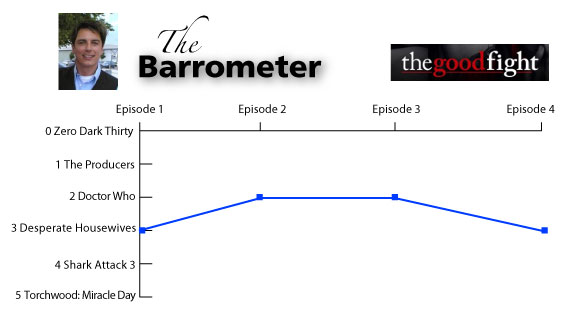

In the US: Sundays, CBS All Access
In the UK: Acquired by More4. Will air in Spring
At the end of my review of the first episode of The Good Fight, a spin-off from The Good Wife featuring some of the less important characters as they face almost identical dilemmas to those faced by Julianna Margulies, I said:
I’ll probably give episode two a watch at least to see if takes the show in a different direction.
Guess what – it did. In fact, following that first episode, the show seems to have picked an entirely new plough to furrow. No longer is it simply about older lawyer Christine Baranski’s pension tribulations or young gay lawyer Rose Leslie having to live down her father’s possible involvement in said Ponzi-esque tribulations. Although these still make up about 50% of every episode, the show is now far more concerned with ‘the good fight’ of the title, looking about how the poor and disadvantaged are served by the US legal system and how C-list defence firms can actually make money.
And here, it’s actually very interesting. There are very strong hints that it knows what it’s talking about, more deeply and more knowledgably in fact than even Goliath. Trials aren’t won by emoting to a jury in the style of Chicago Justice but through application of real laws and consideration of legal principles. The good guys don’t always win, either. Unlike certain other shows, it’s not about what we’d like to be right, it’s about what the law says.
The show’s also intriguingly and explicitly post-Trump. While the first episode opened with Trump’s inauguration, that felt almost tacked on, rather than integral to the plot. Yet by the fourth episode, the firm is having difficulty with regular clients because it was clearly anti-Trump. There’s a trawl to find the one member of staff who voted Trump (Spin City‘s Michael Boatman), the show then making the point that by coming out as pro-Trump, he might well now be ostracised by the rest of the firm for the rest of his career. There’s also a constant refrain of ‘fake news’ lurking in the background.
Where The Good Fight gets a little thorny is a point I hadn’t noticed until this fourth episode – Baranski’s new firm is actually a minority-owned firm. Literally every character at the firm is black, apart from Baranski and Leslie, who then draft in another white Good Wife character (Sarah Steele) to help them out from episode two, despite the show almost immediately pointing out their new firm actually has a (black) investigator already.
Yet despite Delroy Lindo and Cush Jumbo being on hand, very little of the show is actually about them. They’re there, they’re involved, they even have rich white boy Justin Bartha (The Hangover) to woo them in Jumbo’s case, but the story’s following Baranski and Leslie, not them. It’s something the show will hopefully address and mull over in later episodes.
The Good Fight is probably the most interesting US legal drama I’ve seen in a long time. While it never achieves the chess-playing marvels of early Suits, it feels more real and more applicable to everyday life than that show did. However, its soapy back story is a millstone round its neck that I hope it can dispose of once it feels established. It also needs to do more with Lindo, Jumbo and Erica Tazel, who seems to exist purely to be the ‘black b*tch’ who resents Baranski’s presence among the partners. At the very least, it’s only by building up a good roster of its own characters that it can hope to achieve the longevity of The Good Wife.



